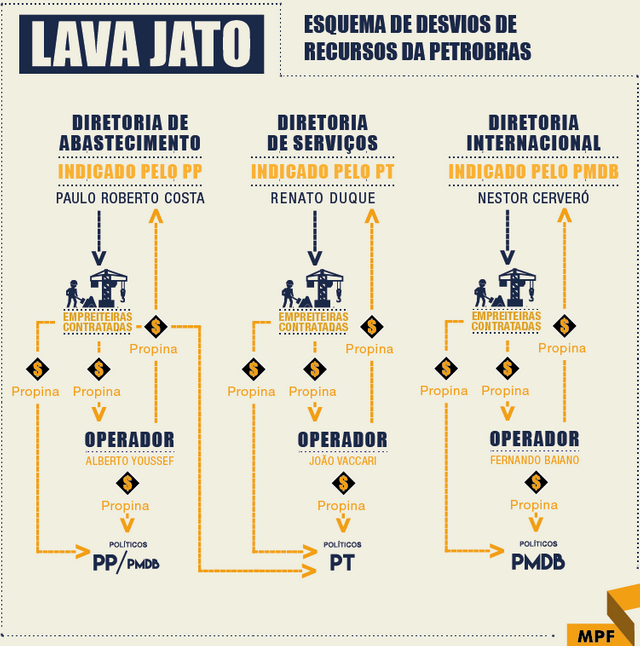The case name
"Lava Jet"
Stems from the use of a fuel station network and wash the car jet to move illicit funds belonging to one of the criminal organizations initially investigated. Although research has advanced to other criminal organizations, the initial name is consagrou.A operation Lava jet is the largest investigation of corruption and money laundering Brazil has ever had.It is estimated that the volume of resources diverted from Petrobras coffers largest state of the country is the home of billions of reais. Added to this economic and political expression of those suspected of participating in the corruption scheme involving companhia.No first moment of research, developed from March 2014, in the Federal Court in Curitiba, they were investigated and prosecuted four organizations criminal led by money changers, which are the parallel foreign exchange market operators. Later, federal prosecutors collected evidence of a vast criminal scheme of corruption involving Petrobras.
In this scheme, which lasts at least ten years, large contractors organized cartel bribes paid to senior executives of state and other public officials. The tuition fee ranged from 1% to 5% of the total amount of overpriced contracts billionaires. This bribe was distributed through financial operators of the scheme, including money changers investigated in the first etapa.
Contractors
In a normal scenario, contractors compete with one another in bids to get Petrobras contracts, and the state would hire the company to accept do the work at the lowest price. In this case, the contractor is cartelizaram in a "club" to replace real competition by an apparent competition. The prices offered to Petrobras were calculated and adjusted in secret meetings in which it defined who would win the contract and what would be the price, inflated for private gain and to the detriment of the coffers of the state.The cartel had even a regulation, simulating rules of a football league, to define how the works would be distributed. To conceal the crime, the written record of the distribution of works was done, sometimes like the distribution of a bingo prizes (see here documents) .
Petrobras employees
Companies need to ensure that only those of the cartel were invited to bids. So it was convenient to co-opt public officials. Employees not only omitted in relation to the cartel, which they had knowledge, but favored by restricting guests and including the winner among the participants in a game of marked cards. According to Petrobras surveys, unjustified direct negotiations were made, celebrated to unnecessary and excessive prices additives, speeded up contracts with suppression of relevant steps and leaked confidential information, among other financial irregularities.Financial operators
Or intermediaries were responsible not only by intermediating the payment of tuition fees, but especially for delivering the disguised bribe clean money to beneficiaries. At first, the money was going to the contractors to the financial operator. This happened in kind, by moving abroad and through simulated contracts with front companies. Secondly, the money was financial operator by the beneficiary in cash, by transfer abroad or on payment of political bens.Politicians
Another line of research - corresponding to its vertical integration - began in March 2015, when the Attorney General the Republic submitted to the Supreme Court 28 petitions for the opening of criminal investigations aimed at establishing facts attributed to 55 people, of whom 49 are holders forum for right function ( "privileged forum").These are people who are part of or are related to political parties responsible for appointing and keep the directors of Petrobras. They were cited in winning collaborations made in the 1st instance by delegation of the Attorney General. The first instance investigate the political agents for misconduct in the civil area, and in the criminal area those without prerogative forum. This policy division proved to be more evident for the following boards: Supply, occupied by Paulo Roberto Costa between 2004 and 2012, of the PP statement, with further support from the PMDB; Services occupied by Renato Duke between 2003 and 2012, indicating the PT; and International, occupied by Nestor Cervero between 2003 and 2008, of the PMDB statement.
For PGR, these political groups acted in a criminal association, stably, with communion efforts and plans to drive to practice various crimes, among which passive corruption and money laundering. Fernando Baiano and John Vacari Neto worked in the criminal scheme and financial operators in the name of the PMDB members and PT.
See the graphical representation of scheme: General Infographic

This was a brief thing I understood.
Thank you for reading this, I wanted to excuse me for my english if it is bad.